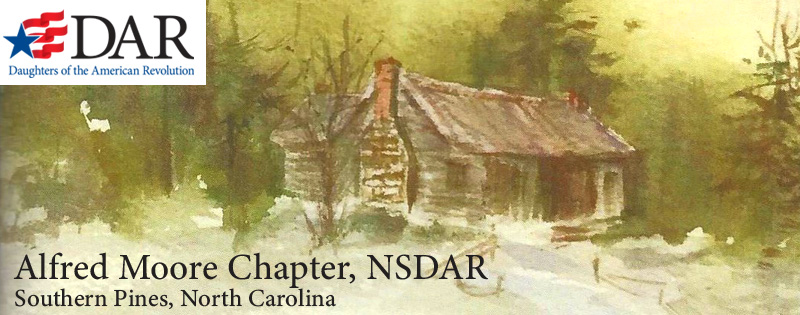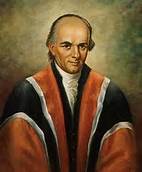
Photo of Original Artwork of Shaw House by Jean Smyth
History

The Alfred Moore Chapter, NSDAR, was organized on September 25, 1924, by Harriett Reed Whitaker of Southern Pines, who was North Carolina State Regent from 1928 to 1931. The chapter took its name from the Revolutionary soldier and statesman for whom Moore County, North Carolina, was named. Alfred Moore was born in Brunswick County, North Carolina, on May 21, 1755, and came from a long line of men important to the formation of North Carolina. He was educated in Boston, returned home to read law in his father’s office, and was licensed to practice in 1775, at the age of 20.
In 1775, Moore received a commission as captain in the 1st North Carolina Regiment of the Continental Line, seeing action at Moores Creek Bridge and in Charleston, South Carolina. In 1777, he resigned his commission due to a family tragedy, but was then once again a member of the North Carolina Militia. In early 1781, with the rank of colonel of the Brunswick County militia, Moore was an active participant in the local resistance to the British occupation of Wilmington which lasted from February until November.
Alfred Moore was elected Attorney General of North Carolina in 1782, serving with distinction for almost nine years. In 1792, he was a member of the House of Commons (Representatives). Upon retirement from office, he became one of the state’s leading criminal lawyers. In December 1799, President John Adams appointed Moore to the position of Associate Justice of the U.S. Supreme Court. He served until 1804, when poor health forced him to retire. He died at his daughter’s home in Bladen County on October 15, 1810, at the age of 55. In 1784, the western portion of Cumberland County was made into the new county of Moore, named for the 29 year old war hero.
The content contained herein does not necessarily represent the position of the NSDAR.
Hyperlinks to other sites are not the responsibility of the NSDAR, the state organizations, or individual DAR chapters.